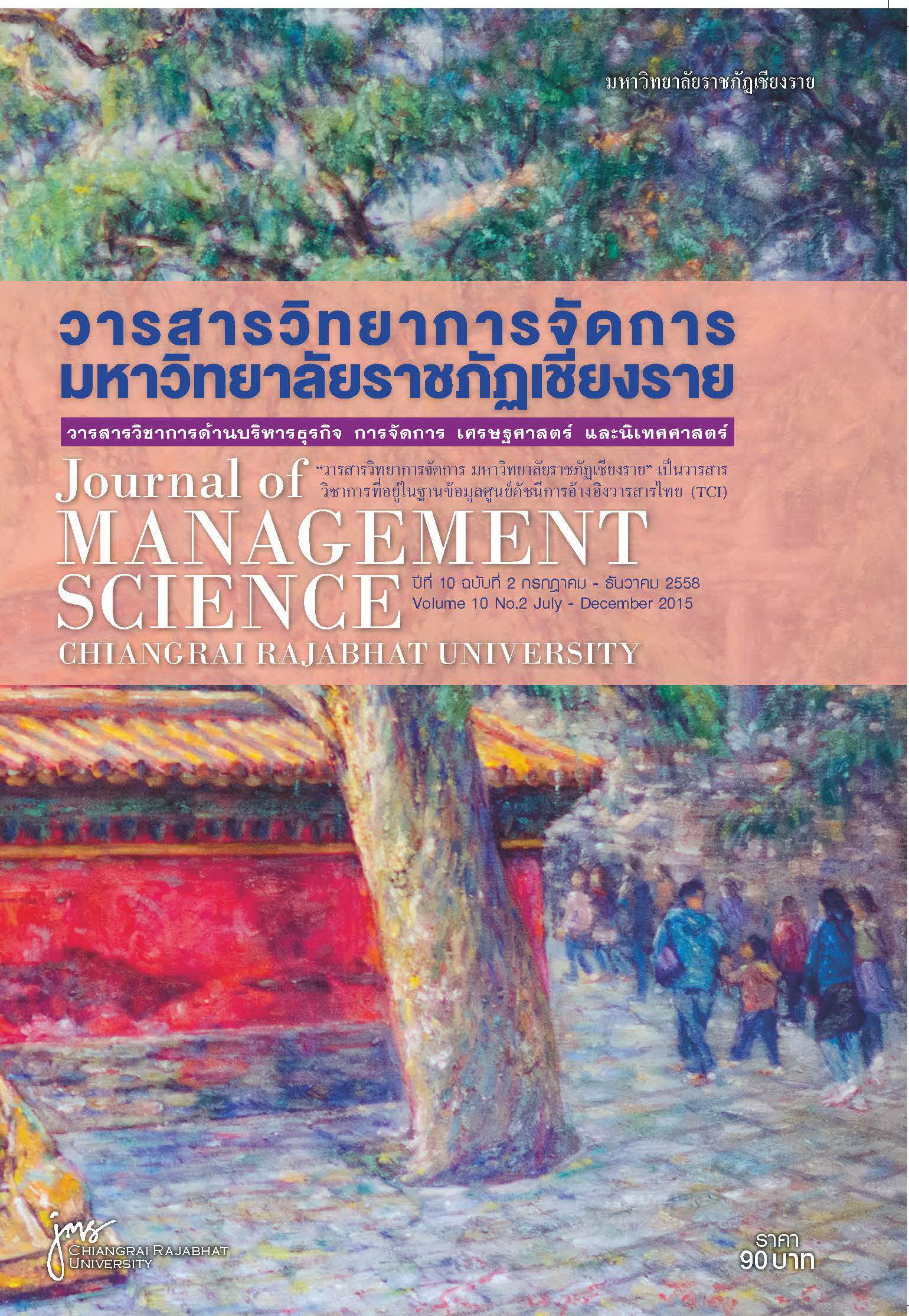The Study Organizational Development of Social Enterprise in Organic Agriculture in Northern Thailand : The case study of Rainbow farm
Main Article Content
Abstract
Social Enterprise in Organic Agriculture in Northern Thailand: the case study of Rainbow farm, the research aimed to study organizational development and to investigate the underlying ideas and administrative process of the farm of social enterprise of organic agriculture in northern Thailand: the case study of Rainbow Farm. The subjects of this qualitative research were a group leaders and members of social enterprise in organic agriculture and scholars in the field. The data-collecting instruments were in-depth interview, focused group, and documentary analysis. The research results had shown that (1) the organization development had based on high performance organization attributions (2) all of the leaders had fully of social entrepreneurs’ characteristics (3) the key factor of administration process’s was the change in organizational culture (4) the organization had built up and developed the network, supported its performance by encouraged the participation and the decentralization to the related sectors for the benefit of society and environment. The findings of this research were (1) the organization development had based on the innovative direction (2) the leadership was highly importance to organization performances (3) the reinforcement from the related sectors and (4) the participation of members in the network were key success factors of organization.
Article Details
Views and opinions expressed in the journal do not necessarily reflect those of the editors.
References
ณรงค์ เพ็ชรประเสริฐ. (2550). ธุรกิจชุมชน: เส้นทางที่เป็นไปได้. บริษัทเอ็กซเปอร์เน็ท จำกัด. กรุงเทพฯ.
นิธินา ศรีประเสริฐ. (2544). 108 วิธีคิด 1009 วิธีการของผู้ประกอบการ Strategy+Marketing for Entrepreneurs. กรุงเทพฯ. บริษัท ทิปปิ้งพอยท์ จำกัด.
วิฑูรย์ ปัญญากุล. (2556). ภาพรวมเกษตรอินทรีย์ไทย ปี 2554-2555. มูลนิธิสายใยแผ่นดิน/กรีนเนท. กรุงเทพฯ.
วีรบูรณ์ วิสารทสกุล. (2557ก). เฉดของประเภทกิจการเพื่อสังคม. (ออนไลน์). แหล่งที่มา: https://wwisartsakul.wordpress.com/2011/09/01/เฉดของประเภทกิจการเพื่/. สืบค้นเมื่อ 7 ตุลาคม 2557.
วีรบูรณ์ วิสารทสกุล. (2557ข). การประกอบการทางสังคมจากปฏิบัติการสู่กรอบกฎหมาย: บททบทวนวรรณกรรม. (ออนไลน์). แหล่งที่มา: http://www.volunteerspirit.org/node/2105. สืบค้นเมื่อ 24 มิถุนายน 2557.
สานิตย์ หนูนิล์. (2557). การวิเคราะห์องค์การประเภทกิจการเพื่อสังคม. วารสารสังคมศาสตร์ มหาวิทยาลัยศรีนครินทรวิโรฒ. ปีที่ 17 ฉบับเดือนมกราคม-ธันวาคม 2557 หน้า 358-372.
สุภางค์ จันทวานิช. (2552). การวิเคราะห์ข้อมูลในการวิจัยเชิงคุณภาพ. พิมพ์ครั้งที่ 9. กรุงเทพ. สำนักพิมพ์แห่งจุฬาลงกรณ์มหาวิทยาลัย.
เสรี พงศ์พิศ. (2548). เครือข่าย ยุทธวิธีเพื่อประชาคมเข้มข้น ชุมชนเข้มแข็ง . สถาบันส่งเสริมวิสาหกิจชุมชน. กรุงเทพฯ.
สำนักงานเสริมสร้างกิจการเพื่อสังคมแห่งชาติ. (2554). ระเบียบสำนักนายกรัฐมนตรีว่าด้วยการสร้างเสริมกิจการเพื่อสังคมแห่งชาติ พ.ศ. 2554. (ออนไลน์). แหล่งที่มา: http://tseo.or.th/news/848. สืบค้นเมื่อ 18 พฤษภาคม 2554.
สำนักงานเสริมสร้างกิจการเพื่อสังคมแห่งชาติ. (2555). SE Catalog รวมกิจการเพื่อสังคมในไทย. บริษัทชิลชิลแคปปิตัล จำกัด. กรุงเทพฯ.
สำนักงานสร้างเสริมกิจการเพื่อสังคมแห่งชาติ. (2557). ยินดีที่ได้รู้จัก...”กิจการเพื่อสังคม”. (ออนไลน์). แหล่งที่มา: http://tseo.or.th/article/513. สืบค้นเมื่อ 24 ตุลาคม 2557.
ศูนย์พัฒนาเกษตรอินทรีย์ มหาวิทยาลัยสุโขทัยธรรมาธิราช. (2557). เกษตรอินทรีย์. ”. (ออนไลน์). แหล่งที่มา: http://www.stou.ac.th/OADThailand/about.aspx. สืบค้นเมื่อ 22 เมษายน 2557.
เอนก เหล่าธรรมทัศน์ และ วลัยพร รัตนเศรษฐ. (2557). รัฐประศาสนศาสตร์พลเมือง. สำนักพิมพ์มหาวิทยาลัยธุรกิจบัณฑิตย์. กรุงเทพ.
Beckenstein, Alan R; Long, Frederick J; Arnold, Matthew B. and Gladwin, Thomas N. (1996). Stakeholder Negotiations: Exercises in Sustainable Development. Irwin. USA. p 1-16.
Bornstein, David. (2007). How To Change The World: Social Entrepreneurs and the Power of New Ideas. Oxford university press.
Doherty, Bob; Foster, George; Mason, Chirs; Meehan, John; Meehan, Karon; Rotheroe, Neil and Royce, Maureen. (2009). Management for Social Enterprise. London. SAGE Publication.
Cameron, Kim. (2004). The Handbook of Organizational Development. University of Michigan. Michael Driver.
Eggers, William and Macmillan, Paul. (2013). The Solution Revolution. Harvard Business Review Press. Deloitte Global Services Limited. USA.
Freedman, Arthur M. (2011). Using Action Learning for Organization Development and Change. The Organization Development Network Inc.
Lynham, Susan A., Chermack Thomas J., and Noggle Melissa A. (2004). Selecting Organization Development Theory from an HRD Perspective. Human Resource Development Review. Vol. 3, No.2: June 2004. SAGE Publications. p 151-172.
Overholt, M,H., Granell, E., Vicere, A.A. and Jargon, L. (2006). How To Build A High Performance Organization. New York: American Management Association.
Patton, M.Q. (1990). Qualitative evaluation and research methods. 2nd ed. Newbury Park. SAGE Publications.
Ridley-Duff, Rory and Bull, Mike. (2011). Understanding Social Enterprise: Theory and Practice. London. SAGE Publication.
Ridley-Duff, Rory and Southcombe, Cliff. (2012). The social enterprise mark: a critical review of its conceptual dimensions. Social Enterprise Journal, 8 (3). Sheffield Hallam University Research Archive.
Robbins, Stephen P. and Judge, Timothy A. (2011). Organization Behavior.14th ed. Global edition. New Jercy. Pearson Education Inc. p 624-653.
Social Enterprise Alliance. (2010). Succeeding Social Enterprise. A Wiley Imprint. California.
Stake, Robert E. (2000). Handbook of Qualitative Research. 2nd ed. Newbury Park, California. SAGE Publications.
Scott, Richard W. (1998). Organizations: Rational, Natural and Open systems. 4th ed. Courier Companies Inc.
Yea-Wen Lin, Shu-ChinTung,Hsiao-Ling Huang, Szu-Hai Lin. (2008). Applying Organization Development Theory into HPH Practices: An Empirical Research of Two Hospitals in Taiwan. The 16th International Conference on Health Promoting Hospitals (HPH). May 15, 2008. Berlin, Germany.
Yunus, Muhammad. (2010). Building Social Business. Public Affairs.


